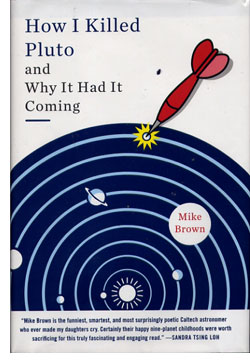 |
 |
 Mike Brown
Mike Brown
How I Killed Pluto and Why It Had It Coming
Reviewed by: Rick Kleffel © 2011
Spiegel & Grau
USA Trade Hardback, First Edition
ISBN 978-0-385-53108-5
Publication Date: 12-07-2010
288 pages, $25
Date Reviewed: 12-31-2010
Index:
Non-Fiction
It's natural to conflate the object of science with the practice of science. We expect those who pursue the perfection of abstraction to do so in a manner that is wholly objective, abstract, and yes, even perfect. When we read that a new scientific paper confirming this or that theory has been presented, our assumption is that the process by which the discovery was made was as bloodless and pristine as the conclusion itself. Scientists stick to the facts, and their lives are presumably as ordered as the papers they write.
Mike Brown's moving and funny memoir 'How I Killed Pluto and Why It Had It Coming' reminds us that science is, first and foremost a human pursuit, undertaken by men and women, not robots. In Brown's world, the scientific method is subsumed into the lives of the men and women who practice science. To be sure, the science we all know and love is here; long nights pouring over photographic plates and writing computer code to analyze the data. But that's just part of Brown's life. While he starts out the book as a bachelor, by the time he finishes off the Solar System as we know it, he's married and has a young daughter, he has comrades who buoy him through tough times and enemies who conspire to demean his work. His is not a scientist's life so much as it is a life, with science.
Brown starts his memoir with the press conference that announced Pluto's demotion from planethood. He's not a part of this, beyond having provided the basis for this demotion, but the local news outlets in Southern California have him up at oh-dark hundred as the events unfold in Prague so he can finally say, "Pluto is dead." He's comfortable with the early hour because he's a new father and he's often awake anyway. Fatherhood makies science look easy.
From there, Brown takes us back on a complex journey that begins in the pristine environment of Palomar Observatory where Brown's very human beliefs and behavior (a hunch and a bet) start him towards the discoveries that will unseat Pluto. His story is charming, informative and offers readers a unique perspective on the practice of science. To be sure, Brown shows us the facts and offers a few figures. But if 'How I Killed Pluto and Why It Had It Coming' sounds like an offbeat mystery, that's because it is. Brown's book examines not just the science that he led him to discover new (as they are now labeled) "dwarf planets," but the very human events and emotions that drive the science.
Brown is a charming narrator and his prose is lively, funny and self-deprecating, especially when he immerses us in the society of science. He meets his wife-to-be at Palomar, and finds himself tongue-tied. He almost outsmarts himself out of their first date, and as their relationship grows his hunt for what he thinks will be the tenth planet becomes entangled in his personal life. We see the candid emails that he and his colleagues exchange, and the tension that mounts once they discover a new and significant object. Having seen and verified the existence of the object does not, for Brown, mean that he can trumpet his discovery. There is painstaking work — in his ethos — that must be completed. But while he is doing that work, there is always the potential for someone else with a different set of ethics to find and announce their discovery. Everything he does is a race against time, and failure is more often his companion than success.
Marriage, children, and yes, computer programming as well as data theft follow in a tightly constructed narrative that is as compelling as it is informative. While readers will learn quite a bit about the Solar System, the real revelations here are not about what planets are or are not. The jaw-drops come as readers get a real understanding of what science is, of the import of human events and human lives in the discovery of abstract ideas. Teaching plays a crucial role, as does office proximity. A cup of coffee with a colleague re-kindles a fire for discovery. Internet chat groups and high-tech detective work reveal data thieves who bridle when confronted with their own unethical behavior. The tension and terror of waiting to see if Brown will manage to get any credit for his work become a propulsive force. 'How I Killed Pluto and Why It Had It Coming' shows how human events influence science, and that the process of science is not scientific, but all too human.
|
 |
|
|
 |
| |
Review Archive
All Reviews alphabetized by author.
General Fiction
Non-Genre, general fiction and literature.
Horror
Supernatural fiction, supernatural horror and non-supernatural horror.
Science Fiction
Science fiction, science fantasy, speculative fiction, alternate history.
Fantasy
Fantasy, surrealism and magic realism.
Mystery
Crime, thrillers, mystery, suspense.
Non-Fiction
Non-Fiction, True Crime, Forteana, Reference.
Poetry
|
|
 |
|




